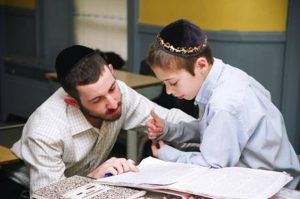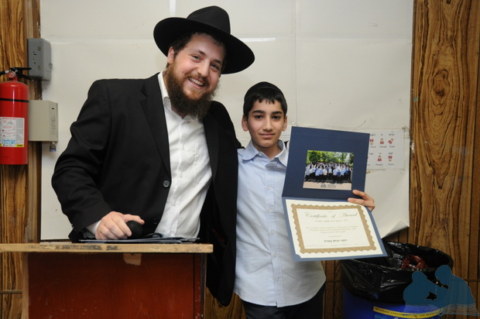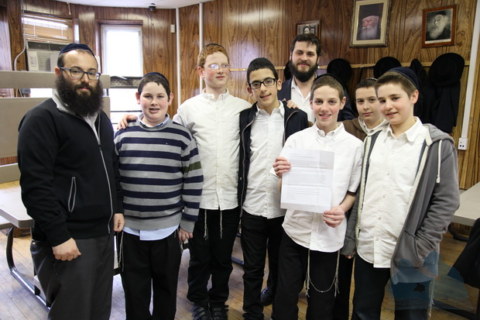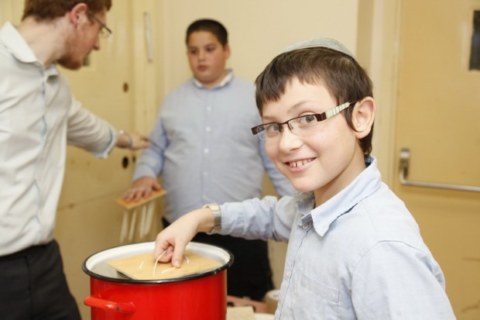Yeshiva Darchai Menachem is a unique boys’ yeshiva in Crown Heights, Brooklyn that creates a learning environment that supports and celebrates its students, many of whom have behavioral and academic challenges. Since 2014, Yeshiva Darchai Menachem has partnered with Hidden Sparks, bringing Andrea Rousso, a Hidden Sparks External Coach into the school on a regular basis to work with teachers and administrators in their efforts to better understand the range of diverse learning styles present in the school.
Spotlight on Schools: Yeshiva Darchai Menachem

The principal, as well as a cohort of faculty, have trained as Hidden Sparks Internal Coaches. In collaboration with Ms. Rousso, they plan professional development and and promote Hidden Sparks practices. In doing so, they have cultivated a school culture where all children can succeed, creating a model for education in the Chabad community. Ms. Rousso has noticed an increase in discussion amongst teachers regarding their mutual students as they develop a common non-judgmental label-free language for talking about students, as well as the expanded use of Collaborative Problem Solving.

Impact on faculty:
- Adopting the mindset of “Children do well if they can.”
- Shift from focusing solely on what do we need to learn, what are the standards, curriculum, to also focusing on teaching methods, best practices and reaching all students. Not just what but how.
- Case study: Rabbi D was a friendly, thoughtful and reflective teacher who very much wanted to meet the needs of all his students. One of the areas that Ms. Rousso focused on with Rabbi D was creating smooth transitions in class. Transitions from one activity to another can be challenging for all students, particularly for those that have some special needs. Working with Ms. Rousso, Rabbi D found that implementing targeted strategies, such as slowing students down when entering and leaving the classroom, and meeting students at the door, led to students settling down and focusing much faster than before. Other strategies that they developed together, such as creating a clear protocol for requesting and receiving assistance during a lesson created a calm, quiet and structured classroom and helped students self-regulate their mood and behaviors. In addition, Andrea provided guidance to Rabbi D on adjusting assessments so that the amount of text on each page was reduced and therefore less daunting for students who struggled with reading or who got anxious at the thought of not doing well.
Impact on Students:
- Principal: “When a teacher walks into a classroom with a mindset and knowledge that the child has challenges rather than a mindset that the child is lazy, the way the teachers treats the student is very different and the way the student responds is different.”
- Case Study: Shimon is a very bright 3rd grader who shifted back and forth between acting in a studious manner and being silly and goofy, such as singing and dancing and climbing up on chairs. Internal coaches had a hunch that boredom might trigger Shimon’s change in behavior so now his rebbe gives him extra assignments, and as drawing was identified as a strength he is allowed to do so when he completes his work. As the unwanted behaviors began to dissipate and his teachers saw what he was capable of, Shimon was moved up a grade and is successful. Ultimately, his rebbe was able to change his mindset about Shimon- rather than thinking of him as disruptive, he thinks of him as a creative child who needs stimulation.
- Case study: Ari was presented to Ms. Rousso as a mystifying 8th grade student. While he was a strong contributor to class conversations, when it came to reading, writing and completing assignments, he was struggling tremendously. Together with teachers, Ms Rousso used the Learning Lenses to help tease out Ari’s strengths in social cognition and higher order thinking, while pinpointing his challenges when it came to reading. As Ms. Rousso guided a reading instructor, Ari began to build skills as multi-sensory approaches to learning to read were introduced, and he has experienced satisfaction in being able to read independently, which he could not do prior. Together, the faculty found a way to support Ari while allowing his strengths to shine.





